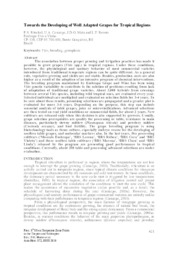Towards the developing of well adapted grapes for tropical regions.
Towards the developing of well adapted grapes for tropical regions.
Author(s): RITSCHEL, P. S.; CAMARGO, U. A.; MAIA, J. D. G.; REVERS, L. F.
Summary: The association between proper pruning and irrigation practices has made it possible to grow grapes (Vitis spp.) in tropical regions. Under these conditions, however, the physiological and sanitary behavior of most commercial varieties introduced from traditional temperate regions can be quite different. As a general rule, vegetative growing and yields are not stable. Besides, production costs are also higher as a result of the adoption of an intensive program of chemical interventions. The breeding program maintained by Embrapa Grape and Wine has been using Vitis genetic variability to contribute to the solution of problems resulting from lack of adaptation of traditional grape varieties. About 3,000 hybrids from crossings between several Vitis species, including wild tropical ones, are evaluated every year. Selected individuals are multiplied and evaluated on selection fields for 3-4 years. To be sure about these results, promising selections are propagated and a greater plot is evaluated for more 3-4 years. Depending on the purpose, this step can include sensorial analysis of table grapes, juice or microvinifications. Advanced selections are then tested on real yield conditions or commercial fields, for about 2 years. New cultivars are released only when this decision is also supported by growers. Usually, grape selection prerequisites are quality for processing or table, resistance to main diseases, particularly downy mildew (Plasmopara viticola) and powdery mildew (Uncinula necator), and bud fertility. The grape breeding program is using biotechnology tools as tissue culture, especially embryo rescue for the developing of seedless table grapes, and molecular markers also. In the last years, five processing cultivars (?Moscato Embrapa?, ?BRS Lorena?, ?BRS Rúbea?, ?BRS Cora? and ?BRS Violeta?) and three seedless table cultivars (?BRS Morena?, ?BRS Clara? and ?BRS Linda?) released by the program are presenting good performance in tropical conditions. Currently, about 200 table and processing advanced selections are under evaluation.
Publication year: 2010
Types of publication: Journal article
Unit: Embrapa Grape & Wine
Observation
Some of Embrapa's publications are published as ePub files. To read them, use or download one of the following free software options to your computer or mobile device. Android: Google Play Books; IOS: iBooks; Windows and Linux: Calibre.
Access other publications
Access the Agricultural Research Database (BDPA) to consult Embrapa's full library collection and records.
Visit Embrapa Bookstore to purchase books and other publications sold by Embrapa.

